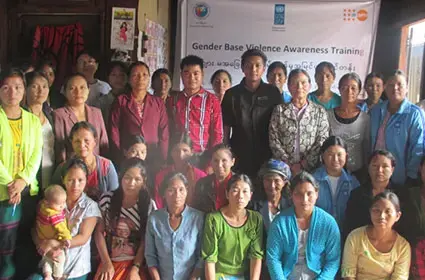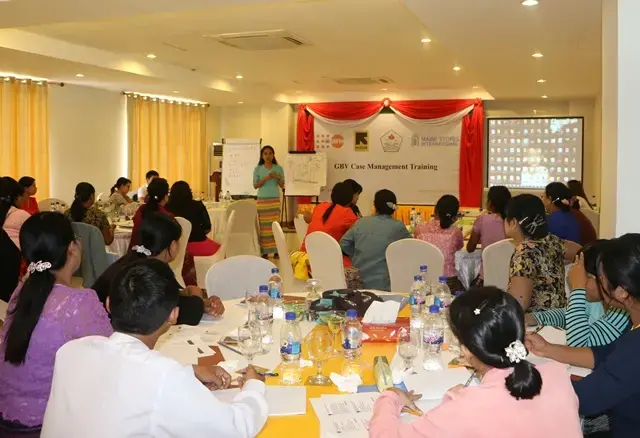A first of its kind workshop for men and boys focusing on the way in which socially ascribed gender roles contribute to gender inequities and violence against women conducted jointly by UNFPA and the Metta Development Foundation (MDF) was held on 11 November 2014 in Waing Maw, Kachin State. The workshop was part of advocacy efforts to encourage and engendering support from men and boys across the community to end violence against women.
UNFPA is providing technical assistance to the Metta Development Foundation with boosting capacity building, prevention and response on gender based violence through its support of 8 Women and Girls Centre’s (WGC) in Kachin State. These areas include both government controlled areas of Myitkyina, Waing Maw and Bhamo, including non-government controlled areas of Laiza, Hpung Lung Yang, Je Yang, Maga Yang and Zai Awng.
The pilot workshop dubbed “Male Engagement” consisted of a group of twenty men and boys living in the surrounding local communities and Internally Displaced Persons (IDP) camps in the Waing Maw area. Similar workshops will be scheduled in the Myitkyina and Bhamo areas.
The overall aim of the workshop was to raise awareness on the normative roles of men and women within the community as a means of identifying the ways in which women and girls may be better protected. The training also included the provision of sensitization around gender based violence and the way in which addressing gender inequities may serve to prevent violence. The training also seized the opportunity to highlight the imperative for psychosocial support and lifesaving medical treatment.
“The Male Engagement workshop was the first of its kind which we have organized in Kachin State and it served as a pilot for other future events. We were very impressed with the large interest for the workshop as well as the overall positive reaction by all of the male participants,” said Lionel Laforgue, UNFPA Programme Specialist for Gender Based Violence and Head of Kachin Office.
The one day workshop built upon a theoretical foundation of gender roles through the use of interactive sessions such as role plays to act out real life scenarios. These role plays served to enhance an understanding of gender inequities and the effect of enforcing inequities as a way of serving to better protect women and girls from gender based violence.
“There is a case of domestic violence in my camp where a man is beating his wife and sons. Before I did not care to get involved as I thought it was an internal family affair. However now I understand this is gender based violence, and I will ask him to stop beating his wife, and share the messages which I have learnt from today workshop,” said a Camp Leader from the Waing Maw camp.
Another participant said, as he was leaving the workshop that: “I used to blame or shout at my wife whenever I came back from work, but now I understand that this kind of treatment of her is considered an act of violence. From now on I will try not and do this to my wife.”
“Today we learnt about gender based violence and gender equality. We are (as a result) happy to transfer our knowledge from the workshop back to our communities,” said a participant.
UNFPA is the lead UN agency for the provision of comprehensive and multi-sectorial gender based violence programmes across Myanmar as well as coordinating gender based violence interventions and providing technical support and capacity building for organisations in the humanitarian response in Kachin and Rakhine states throughout the region




